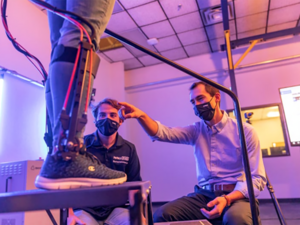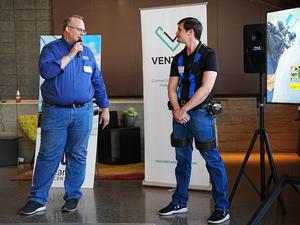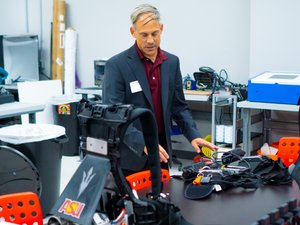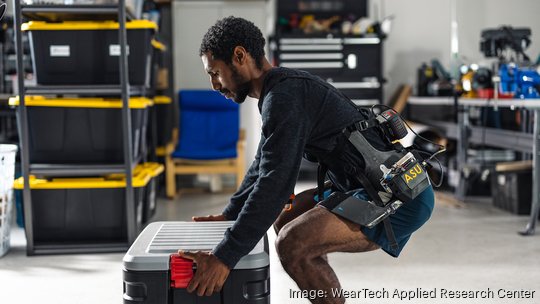
For nearly a year, companies in Phoenix's WearTech Applied Research Center's second cohort have been conducting lab research and testing products that advance health care.
Now, five of those companies are launching their wearable technologies on the market faster than anticipated with other products developed by the cohort soon to follow.
“Our hypothesis is that as we develop these products and they go to market, the companies that are participating in the program build those products here in Phoenix and that helps us diversify our economy,” said Wes Gullett, director of operations at the WearTech Applied Research Center.
Some of the products developed by the 2022 cohort include wearable technologies to reduce anxiety, detect brain injuries in athletes and provide on-demand mobility assistance for those with walking disabilities.
Typically, companies accepted into WearTech’s cohort have already perfected their technologies via prototypes, but need to validate it in a clinical setting, Gullett said.
“We can accelerate that validation phase. It's usually the longest period of time in the life of a product because the private venture capital markets want to see a validated product,” he said. “We're providing the opportunity to bridge through that validation phase and it really accelerates the development of these products. Because, otherwise, they're just scrapping it together, it takes forever and there's a lot that goes into it, especially if it's going be FDA approved.”
In 2021, the state Legislature earmarked $5 million to applied research centers in Arizona, including $2.5 million for wearable technology projects. That funding is matched by the private sector. The Arizona Commerce Authority awarded $1.6 million to the WearTech Applied Research Center to support its 2022 cohort of eight projects, which are developed in partnership with Arizona State University, University of Arizona and Northern Arizona University.
The WearTech Applied Research Center, at Park Central in midtown Phoenix, is a public-private partnership between the Partnership for Economic Innovation, Arizona State University and the state government. It was launched in 2019 with a mission to expand the wearable technology ecosystem in the state.
Wearable technology being brought to market
At the WearTech Applied Research Center, Movement Interactive, in partnership with ASU’s BRAIN Center, developed the HijiBand, a sensor with an athletic headband that monitors biomarkers of traumatic head injuries in athletes.
The HijiBand is now widely used among athletes nationwide, including the Women's Premier Soccer League, said Eric Luster, CEO and founder of Movement Interactive.
A former nuclear biological chemical specialist for the U.S. Army, Luster also developed HijiSense, which are compression socks that monitor falls in older adults and those with balance issues; and Hiji Tactical, a band that monitors head impacts during military operations, training and combat. All of the products connect via a Bluetooth sensor and mobile device through an app that sends real-time alerts.
“We had some things that needed fine tuning, so through WearTech, we were able to really get that done,” Luster said, adding the center assisted with institutional review board user studies conducted with the Women’s Premier Soccer League.
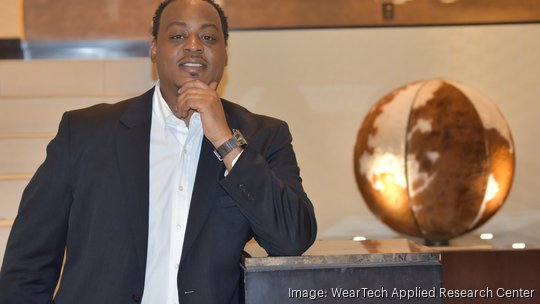
In addition to working with the WPSL, Movement Interactive landed a contract with the U.S. Department of Veterans Affairs to use its products for the agency's remote patient monitoring program, which serves 90,000 veterans, Luster said.
“We have a big VA contract to support now. The WPSL is still continuing to grow. And we would like to extend our reach within youth sports,” Luster said.
Phoenix-based GoXLabs and Augspurger Komm Engineering, in partnership with ASU, is developing PhenEx, an exoskeleton with springs that aid in lifting or squatting to reduce workplace-related injuries.
The exoskeleton is validated and the two companies are beginning the process of manufacturing and marketing it.
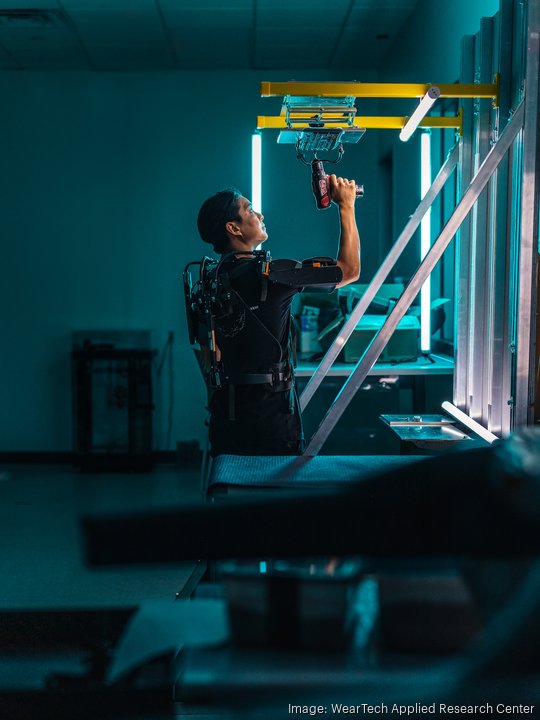
GoX Labs, which develops other wearable technologies to predict and prevent workplace injuries, has been a tenant of the WearTech Applied Research Center since it opened in 2019, said Joe Hitt, CEO and co-founder of GoX Labs.
“I think it's a great model. It's different than incubators. There's a ton of incubators out there that are trying to help new businesses that aren't businesses yet, “ Hitt said. “But WearTech is a place where businesses at the next stage can grow. That’s what we need and I don’t know of any other organization like that here in Arizona.”
WearTech Applied Research Center has been instrumental in GoX Labs' growth by providing support and experts, Hitt addec.
"Having a great facility in the middle of downtown surrounded by schools and hospitals is just fantastic,” he said. “Then, having the opportunity over the last several years to have matching funds and to be able to work on projects like this has really helped us to innovate and grow our business.”

